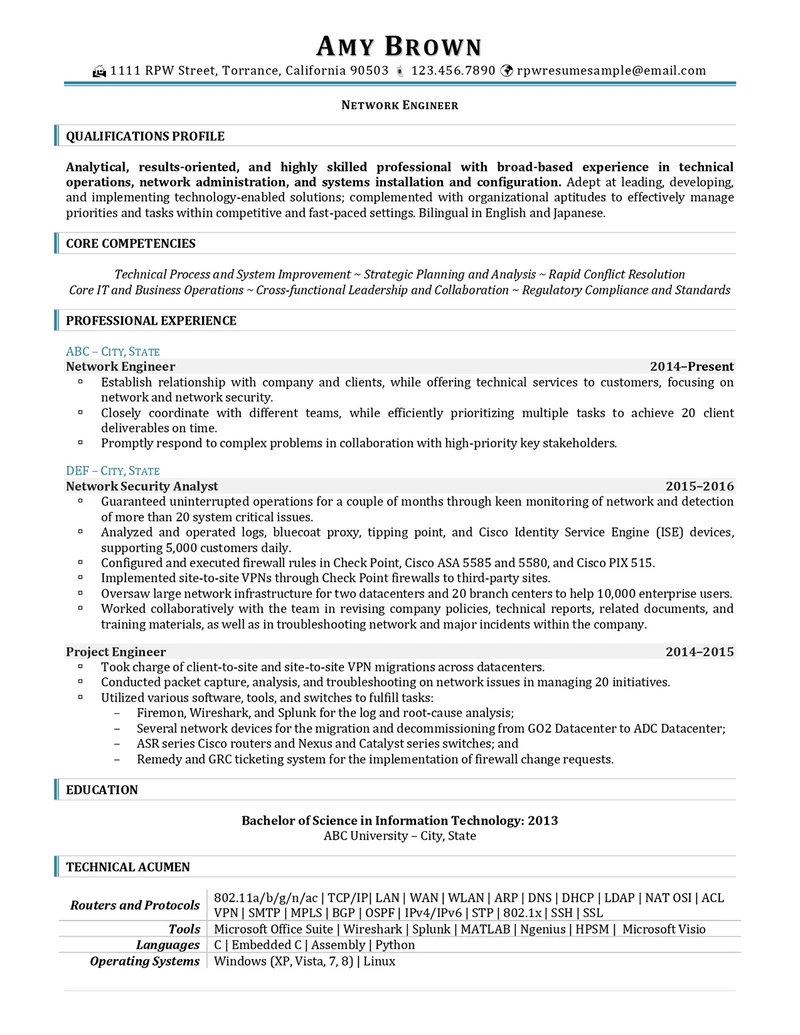The United States Bureau of Labor Statistics reports that job opportunities for network and computer systems administrators is estimated to increase by 5% from 2020 to 2030. This is slower than the average for all occupations. However, every year, there’s an average of approximately 24,900 job openings for such positions, including posts for network engineers.
With these in mind, it’s crucial that you level up your job search game if you’re dreaming to be part of this profession. To stand out among other job candidates, make sure to have a network engineer resume that highlights what you can bring to the table.
If you’re looking for a guide on how to write one, you’re in the right place! In this article, we’ll give you an overview of network engineering. We’ll also share with you effective tips on how to craft a job-winning network engineer resume, along with an example to help you ace your job search.
What is a Network Engineer?
As one of the professionals in the technology field, network engineers are trained IT specialists who offer experience in programming and expertise in cybersecurity. They also serve as a host of other technical networking skills who are responsible for designing, setting up, developing, and maintaining computer networks.
Furthermore, network engineers take charge of testing and documenting computer network behavior, performance, and security to guarantee optimal performance. It’s also important to note that these professionals can specialize in different responsibilities. These include cloud networking architecture, network security, voice over internet protocol (VoIP), and data center implementations.

What are the Duties of a Network Engineer?
Apart from the above mentioned tasks, network engineers also fulfill a wide array of duties. These include the following:
- Maintain and administer computer networks and related computing environments, including systems and applications software, hardware, and configurations;
- Monitor network engineering performance and ensure system availability and reliability;
- Protect data, software, and hardware through coordination, planning, and implementation of network security measures;
- Configure and install several network devices and services, such as routers, switches, firewalls, load balancers, virtual private network (VPN), and quality of service (QoS);
- Conduct disaster recovery operations and data backups as necessary;
- Perform network maintenance and system upgrades including service packs, patches, hot fixes and security configurations;
- Troubleshoot, diagnose, and resolve hardware, software, and other network and system problems;
- Provide tier 2 and 3 support to internal and external customers;
- Handle the configuration of routing and switching equipment; and
- Design, configure, and test networking software, computer hardware, and operating system software.
How Do You Become a Network Engineer?
In order to pursue a career as a network engineer, you’ll need to possess the following qualifications, skills, credentials, and requirements:
- Bachelor’s degree in information systems, systems engineering, computer science, network engineering, or related fields;
- Certifications including CompTIA A+, CompTIA Network+, CompTIA Security+, and Certified Information Systems Security Professional (CISSP);
- Familiarity with application transport and network infrastructure protocols;
- Experience in network security, local area network (LAN), and wide area network (WAN); and
- Excellent analytical and problem-solving skills
Expert Tip:
If you already have such qualifications, it is highly recommended to include these on your network engineer resume. Doing so will help boost your chances of acing the screening process, especially if these are also stated in the job posting.
What to Include on Your Network Engineer Resume
Of course, you’ll need a resume first before landing your dream job as a network engineer. Hence, in order to grab the hiring managers’ attention, it’s crucial that your network engineer resume contains all the necessary elements. In addition, including these in your job search tool can also help beat the applicant tracking systems (ATS).
Contact Information
Starting at the top of your resume, write down your full name, complete mailing address, phone or mobile number, and email address. Make sure that such details are correct and accurate to avoid missing job interview invitations.
🔍 Think Your Resume’s Fine? Let’s Double-Check That
Even strong resumes can miss critical details—especially when it comes to passing Applicant Tracking Systems (ATS). Our specialists offer a free review to uncover gaps, improve formatting, and ensure your resume is ATS-ready and recruiter-friendly.
Apart from these, you may also include your certifications beside your name, as well as your LinkedIn profile URL or personal website, if there are any. If you have a personal website or portfolio, you might explore tools like domain name search engines to find a unique and memorable domain that aligns with your professional brand.
Specific Target Job Position
Indicating your target position on your network engineer resume helps hiring managers identify what post you’re applying for. This will also leave them an impression that you’re a goal-oriented individual.
Qualifications Profile | Summary of Qualifications
Hiring managers spend an average of seven seconds scanning an applicant’s resume. Hence, it’s crucial that you highlight your qualifications relevant to the job position you’re aiming under this section in a brief and concise manner. Make your resume summary interesting by writing three to five sentences stating what you can bring to the table.
Expert Tip:
Avoid writing a resume objective-type statement. Instead, use strong resume titles and headlines to keep the hiring managers engaged in reading your resume.
List of Network Engineer Skills
Nowadays, employers use ATS to easily screen qualified job applicants. This system assists hiring managers identify who among the candidates is the perfect fit for the job. That being said; make sure that your job search tool contains not only soft skills but also industry-specific skills. Here are some of the skills you should put on your network engineer resume to pass the screening process.
Soft Skills:
- Customer relations
- Analytical skills
- Problem-solving and decision-making skills
- Written and verbal communication skills
- Time management
Industry-Specific Skills:
- Firewalls and Security
- Networking
- Programming languages
- Hardware and infrastructure
- Domain-name system (DNS)
- Internet of things (IoT)
- Virtualization and automation
- Multiprotocol label switching (MPLS)
Related Article:
Ways to List and Create Headings for Job Skills in a Resume and 8 Essential Job Skills to Include in Your Resume
Work Experience
Your work experience section serves as the bread and butter of your resume as it showcases how much experience you have in the industry. Furthermore, this portion helps hiring managers identify and evaluate if your previous roles, duties, and responsibilities are aligned with what they are looking for.
Expert Tip:
Make it a point to include the company names and their locations, your job titles, and inclusive employment dates. Meanwhile, use bullet points when detailing your job descriptions, accomplishments, and contribution so readers can easily digest the information on your network engineer resume.
Education
As mentioned, you’ll need to earn a degree relevant to network engineering before you can embark on this career. Keep in mind that educational background is one of the most important factors that employers check when hiring job applicants.
Related Article:
The Ultimate Guide to Writing a Resume with No Work Experience
When presenting your education section, write your complete degree and course title, school name and its location, and the date of your graduation. In addition, you may include your academic awards, recognition, honors, and scholarship received to spice up your resume.
Certifications, Licenses, and Training
One of the requirements to land a network engineering job is certification. Therefore, if you already have certifications including Cisco Certified Network Associate (CCNA), Cisco Certified Network Professional (CCNP), Cisco Certified Internetwork Expert (CCIE), and other related credentials, don’t forget to include them.
Likewise, if you’ve actively participated in training, seminars, and workshops related to the industry, make sure to include them as these can add credence to your job application.
Other Optional Sections to Include in a Network Engineer Resume
Aside from these sections, you may also opt to add other important details, such as your professional organizations, community involvement, activities, and technical skills. These will help you outshine other applicants.
How to Write Your Network Engineer Resume
After learning the important parts of a resume, we’ll now share with you some effective tips on how to write a job-winning network engineer resume. Read on.
1. Choose the right resume format.
Using the best resume format that showcases what you can contribute to your target company increases your hiring chances. This also lets hiring managers evaluate and determine if you’re a perfect fit for the job.
Take note that there are four types of resume formats: chronological, functional, targeted, and combination formats. Thus, make sure to choose the right resume format that will show off your best feats to the recruiters.
Related Article:
2. Apply simple yet attractive design.
Keep in mind that apart from the content, your resume layout and design also add value to your job application. That said, we do not recommend utilizing too much borders, decorative designs, and fancy font styles. Instead, apply a simple yet attractive design that will emphasize your strengths and qualifications.
Related Article:
3. Highlight your network engineering skills.
Showcasing your skills and abilities relevant to network engineering is one of the best ways to get the employers’ affirmative response. Not only that, it’s also important to include your soft skills as these are also integral for your application tool.
4. Sprinkle resume keywords and action verbs.
Since most of the companies use ATS in screening resumes, spreading keywords in your document is a must. These keywords help both the systems and hiring managers assess if the candidates possess the qualifications they are looking for. Having said that; be sure to read the details of the job posting carefully and spot the keywords and phrases used in the announcement.
Meanwhile, enumerating your job duties, accomplishments, and contributions using powerful action verbs is highly recommended. Doing so can make your network engineer resume more action-oriented.
5. Proofread and edit.
Before submitting your job application tool to your dream company and other job sites, make sure to review it a couple of times. This will help you identify and correct errors including grammar and punctuation mistakes, typos, and inconsistencies. In addition, you might also ask for someone’s assistance to ensure an error-free resume.
Expert Tip:
Want to receive feedback from professional resume writers? Let our experts critique your existing job search document! Resume Professional Writers offer free resume review to help you optimize your tool.
Network Engineer Resume Example
Take a look at a network engineer resume sample below written by one of our professional resume writers. This will help you craft your own job search document by applying the tips stated above.

Note: For more ideas, you can check out our other information technology resume examples.
Land a Network Engineer Position with the Help of Experts
Writing an effective resume is not as easy as ABC. It requires knowledge and skills in translating and marketing your expertise and qualifications in paper. But if you’re not capable enough to sell yourself to employers, we’ve got your back! Let our professional resume writers help you step up your game and land your dream job with an interview-generating network engineer resume. Contact us today to get started.








